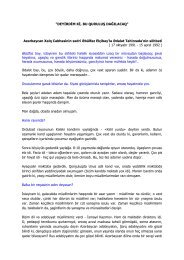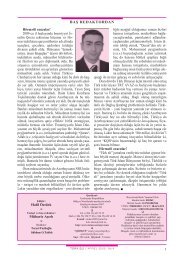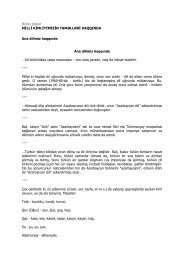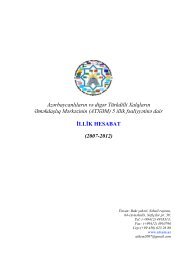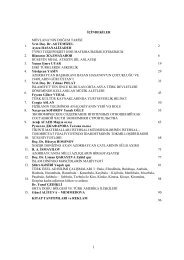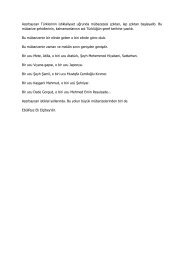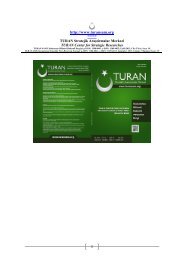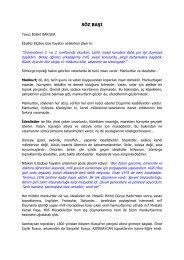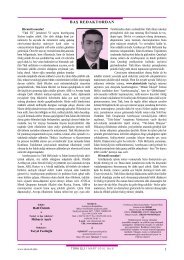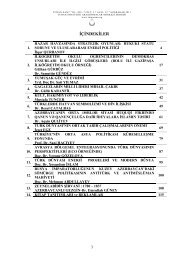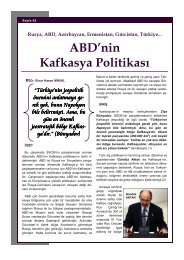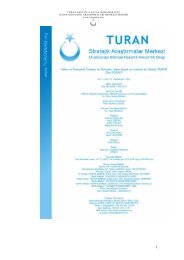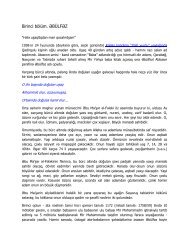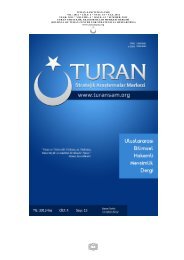16. Sayı; TURAN-SAM SONBAHAR Sayısı, 2012
16. Sayı; TURAN-SAM SONBAHAR Sayısı, 2012
16. Sayı; TURAN-SAM SONBAHAR Sayısı, 2012
Create successful ePaper yourself
Turn your PDF publications into a flip-book with our unique Google optimized e-Paper software.
<strong>TURAN</strong>-<strong>SAM</strong>(<strong>TURAN</strong>-CSR)YIL: <strong>2012</strong> * CİLT: 4 * SAYI: 16 * <strong>SONBAHAR</strong>, <strong>2012</strong>YEAR: <strong>2012</strong> * VOLUME: 4 * ISSUE: 16 * AUTUMN, <strong>2012</strong><strong>TURAN</strong> STRATEJİK ARAŞTIRMALAR MERKEZİ DERGİSİ(JOURNAL OF <strong>TURAN</strong> CENTER FOR STRATEGICAL RESEARCHES)www.turansam.orgexist, sermons were more important as tools of verbal influence. But oncepeople entered the media’s influence sphere, literacy increased and bothreligious and non-religious information began to be read from books and frominternet, and listened to through media; sermons lost their importance as toolsof verbal influence on society.5- Both the Department of Religious Affairs and the Foundation ofReligious Affairs have websites. 28 Although these are important websites anddo attract followers, they can be considered insignificant next to the thousandsof religious websites and Facebook pages set up by religious communities andindividuals.In earlier times the Department of Religious Affairs prepared reports againstİslamic groups like the Nurcu movement. 29 After the 1980s, long term single partygovernments like ANAP and AKP developed a significant base within Islamic circles;because of their base and their ideologies, these parties did not enlist the Departmentof Religious Affairs to act against influential Islamic communities. In addition to thesupport afforded by the attitudes of these parties, the independence of religiouscommunities was also bolstered by the increase in liberal tendencies seen after the1980s and the fact that other minority parties also did not want not to antagonize thesecommunities, which constituted significant voter potential. As a result, therepresentation of different ideologies in the centre and a decrease in the tendency tokeep civil society under control has resulted/is resulting in the fact that theDepartment of Religious Affairs is not being used to promote the founding ideology,in the same degree, as it used to.Some aspects of the Department of Religious Affairs, since the beginning ofthe Republic, have not undergone any changes. The department is used first of all toprevent movements that may attempt to change the regime via a top-down revolution,and secondly to integrate society via a Durkheimian role. The department can be saidto be a successful ideological tool in terms of the realisation of these objectives. Onthe other hand, if we consider that secularising individual lives and reducing thenumber of religious references constitutes a significant element of the state’s foundingideology, the Department of Religious Affairs cannot be said to serve this purpose. Asis the case with other monotheistic religions, the message of Islam shapes individuals’existential world view in line with an ontological and epistemological understandingwhere religion is above all other world views/philosophies of all kinds. This worldview is by nature antithetical to an ideology that aims for the reduction of religiousreferences. It is clear that an institution that states its views on the basis of religioussources, conducts Quran courses, and organises prayers is diametrically opposed to anideology that aims for the secularisation of society. What we can infer from this stateof affairs is that the principles of the founding ideology are based on a hierarchicalstructure. The ideological principle of top priority – and related to laicism – for thestate centre has always been to prevent the state from falling under the control ofreligion. This has been accomplished by policies such as passing laws that are notbased on religious references and using the Department of Religious Affairs to serve28The most important websites are as follows: www.diyanet.gov.tr, www.diyanetvakfi.org.tr,www.diyanetvakfi.gov.tr, www.isam.ogr.tr.29 İsmail Kara, Cumhuriyet Türkiyesi’nde Bir Mesele Olarak İslam, p. 152-161.15



